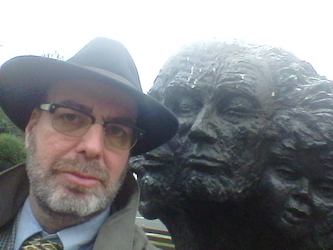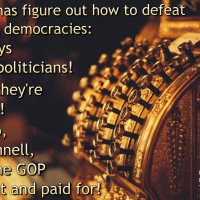I wasn’t ever sure that protests had any real effect on elections, but, apparently, they do. I was always apprehensive that protesting felt good. It felt like you were doing something. You got all emotional and were out with other like minded people. It is the effect of being in a big crowd. However, I feared that once you protested, the individuals would go home and (a) feel like they’d done their part and (b) spent all of that emotional energy, and, as a result, not necessarily go out and vote. This study suggests that my fears were unfounded.
Protests help people feel energized and galvanized. Protesters go home and start thinking about what else they can do for the cause. For the side protesting that means turning out for the next election and for the side being protested against, suppressing the turnout. Interestingly, it is not symmetrical… or rather is oddly symmetrical. According to the study liberal protests boost Democratic turnout by 2% and conservative protests suppress it by 2% while liberal protests suppress Repube turn out by 6% and conservative protests boost it by 6%. Now, that’s an interesting statistics. I will note that in their data base, there probably weren’t as many instances of conservative protests as liberal. I mean can we really call the Moral Majority of Reagan’s time protests? So, what does that leave, the Tea Party mob?
I guess one thing that protesting signifies is a willingness to act on one’s convictions and introduces a group effect to behavior. One way to increase voter turn out is let people know which of their neighbors have voted. It is that collective intelligence of the beliefs and behaviors of those around us significantly shaping our beliefs and behaviors.
Have a read of the study yourself, and let me know what stands out for you in the comments!
How Protests Can Swing Elections
A new study shows that both liberal and conservative protests have had a real impact on U.S. House elections.
Edmund L. Andrews 30 October 2018
From anti-war marches in the 1960s to the Tea Party rallies of 2010 and the almost nonstop progressive protests in 2018, marching in the streets has been a fixture of modern American life.
But do protests actually accomplish anything in terms of election results or the balance of party power?
Absolutely yes, according to a new study based on 30 years of data.
Co-authored by Sarah A. Soule at Stanford Graduate School of Business and Daniel Q. Gillion at University of Pennsylvania, the study finds that spikes in both liberal and conservative protest activity can increase or decrease a candidate’s vote by enough to change the final outcome.
“Many people are skeptical that protests matter to electoral outcomes, but our paper finds that they have a profound effect on voter behavior,” says Soule. “Liberal protests lead Democrats to vote on the issues that resonate for them, and conservative protests lead Republicans to do the same. It happens on both sides of the ideological spectrum.”
Continue reading at The Standford Graduate School of Business: How Protests Can Swing Elections | Stanford Graduate School of Business
Photo Accreditation
The media accompanying this post was the original photo published with the article. Photographer: James Lawler Duggan Service: Reuters
Categories: ReBlogged
















I found, at the age of seventeen, that protesting does change elections. I was involved in getting voter’s rights to everyone back in the early 70’s….and I do mean early! (LOL). Getting out and protesting brought people together, made us more focused on other things we could do as a group to make changes. It galvanized us. The group made us more willing to fight the social norms and pay the consequences for our actions.
LikeLiked by 1 person
Howdy Suze!
I’m such a social psych the situation determines 70% of your behavior kinda guy that I’m embarrassed that I overlooked this vital aspect of protest. I’ve been to a few protests in my life and understood the community and camaraderie that it could build and the organizing that it developed.
We should never overlook the contributions that past protesters have made to our nation. Hopefully, our protests these past few years can save us from our own worst tendencies… again.
Huzzah!
Jack
LikeLike
Reblogged this on cabbagesandkings524 and commented:
Calico Jack on the effects of protests on voter turnout.
LikeLiked by 1 person
I’m wondering about the effects on the “independent/unaffiliated” and infrequent voters when seeing on their news that large numbers of people feel strongly enough about something to be out in the streets. Does it make them think they need to consider the issue more seriously and go vote? Or, do competing protests tend to make them throw up their hands and go back to watching football?
The question of the effect of violent protests gets brief mention toward the end of the report. I suspect that it tends to galvanize some to resist, and encourage the violently inclined fringe both for and against.
The big take away is; Liberals, progressives, climate activists, anti-racist, anti-misogynist, etc., Into The Streets, all together.
LikeLiked by 1 person
Howdy Bob!
I’ve wondered the same thing myself. One of the effects that mass protests have on the psyche is to suggest that many people hold the same or similar opinions. That will help people adjust their beliefs and opinions to match… I think the caveat of as long as they identify with the protesters should be added. My mother was solidly against the Vietnam War protesters in part because she couldn’t identify with the long-haired hippy types. She was against the women libbers, too, for the same reasons even though they were fighting for her as a female head-of-household.
I also think that when protests go from peaceful to violent, people turn away because we don’t have violent protest as part of our cultural norms. It is not how we resolve our differences.
But, in terms of counter-protests, I think the Tea Party and Occupy Wall Street and our current anti-Trump protests strongly indicate that counter-protests just don’t occur with the same strength and frequency. The issue on the other side is often not as compelling or clearly formulated. That’s funny, isn’t it?
I’m hoping that as the year progresses and the election nears, we have more mass protests to help keep people’s spirits up and moving us forward.
Huzzah!
Jack
LikeLiked by 1 person
I think he and his enablers will provide plenty to protest.
LikeLiked by 1 person